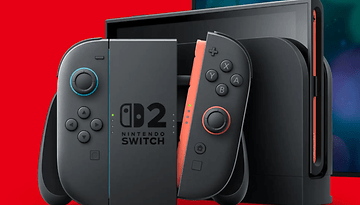Apple Event Highlights: iPhone 15 Lineup, Watch Series 9, and the Watch Ultra 2
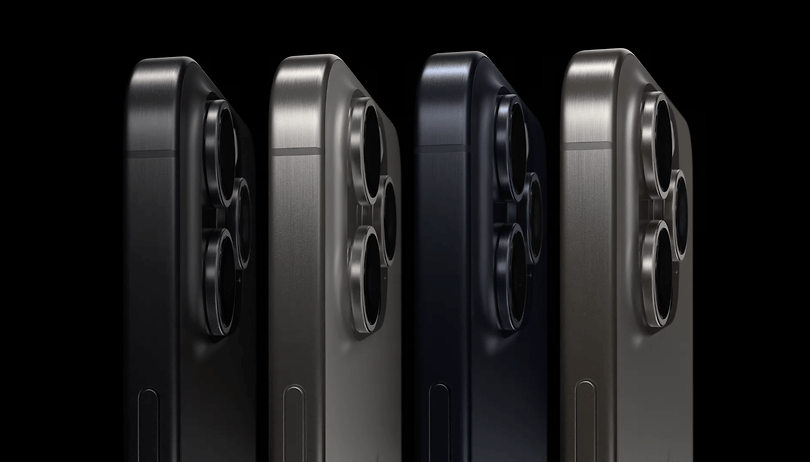

At its 'Wonderlust' event, Apple unveiled the new iPhone 15 series, boasting numerous innovations for both the standard and Pro series. However, there was no mention of an "iPhone Ultra." Additionally, two new Apple Watches were introduced, as well as the new operating system versions: iOS 17 and watchOS 10. Nextpit has summarized all the highlights for you.
For those rushing, here's how to pre-order the new iPhone 15 series and Apple Watch models.
All about the new iPhone 15 series
Yes, it really happened: All new iPhones in 2023 will have a USB-C port. And yes, Apple sold it like the world's most brilliant invention. And honestly, we're probably all glad to have one less kind of cable in our lives again in the medium term—and I'll just say: thank you, EU.
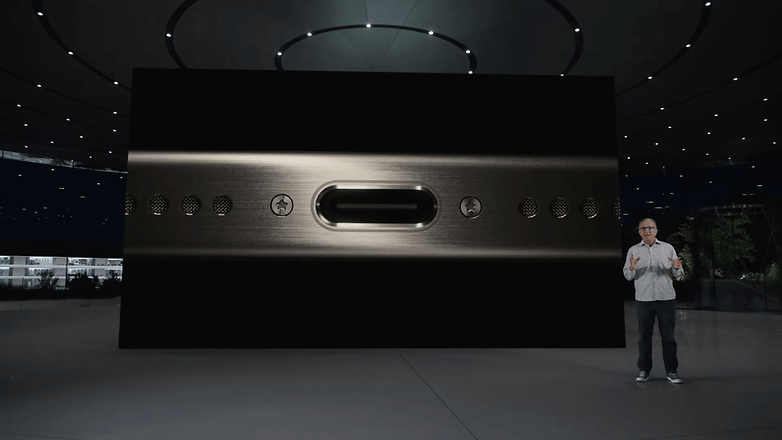
All new iPhone models also get the new U2 chip for UWB radio. According to Apple, the range is three times higher than the previous generation. In addition, UWB on the iPhone can now be used to find friends - as with AirTags using direction and distance.
iPhone 15 and iPhone 15 Plus
The standard iPhones are also the little siblings in 2023, which will eventually get the toys of the "big ones" passed through. Thus, with the iPhone 15 and iPhone 15 Plus, Apple continues its strategy of bringing the latest Pro features to the new standard iPhone models with a one-year delay.
This starts with the display: The iPhone 15 (6.1 inch) and iPhone 15 Plus (6.7 inch) get the Dynamic Island, which means that the notch has finally been eradicated from the Apple portfolio. In terms of brightness, the screens have made good gains with 1,600 nits peak brightness and up to 2,000 nits in full sun (iPhone 14: maximum 1,000 nits).
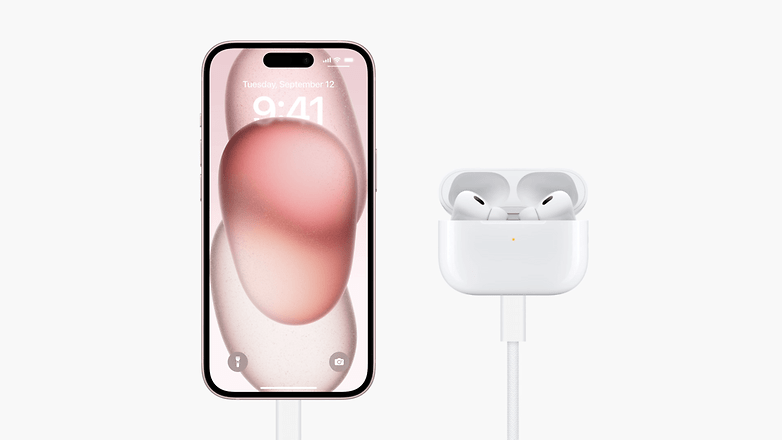
However, not all Pro features make it to the ordinary iPhone 15: ProMotion with 120 Hz as well as the Always-On display will still be reserved for the Pro models, at least in 2023.
In terms of the processor, the iPhone 15 and 15 Plus will also get an upgrade to the Apple A16 SoC, which we already know from the iPhone 14 Pro (Max). And yes, the 48-megapixel camera from last year's Pro iPhones is also in the standard models this year - but here with F1.6 aperture.
However, the ultra-wide-angle camera has the same 12 MP sensor as in the iPhone 14, and the telephoto lenses are again only available in the Pro iPhones. At least: Thanks to the higher resolution, the lossless 2x zoom is available.
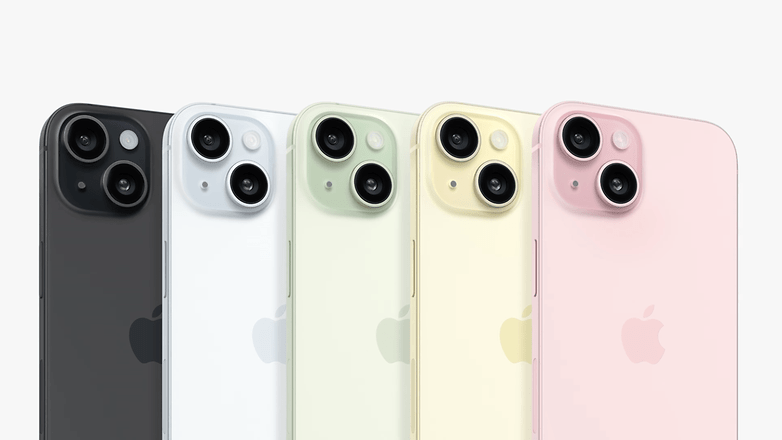
Finally, there's a minimal change in the design: The back of the iPhone 15 and iPhone 15 Plus no longer has a high-gloss look, but is made of frosted glass that was completely colored through. Usually, this "frosted glass" was reserved for the Pro models. By the way, this year's colors are red, blue, green, white and black—and for the first time, colorful USB-C cables are also included.
You can pre-order the iPhone 15 and iPhone 15 Plus from September 15, 2023. It starts at $799 for the iPhone 15 and $899 for the iPhone 15 Plus.
iPhone 15 Pro and iPhone 15 Pro Max
The new flagship iPhones are called iPhone 15 Pro and iPhone 15 Pro Max, an "Ultra" variant is only available for smartwatches this year at least—but we'll get to that soon.
The iPhone 15 Pro and 15 Pro Max bring a few razor-thin design changes. The 6.1-inch and 6.7-inch displays have slightly narrower bezels, and the cases, which are also slightly rounder, are a full 10% lighter thanks to titanium instead of stainless steel.
Apple has also retired the DnD slider in the Pro series. Instead, there is an action button that you can freely assign, for example with the camera app, the flashlight or the voice memo app.
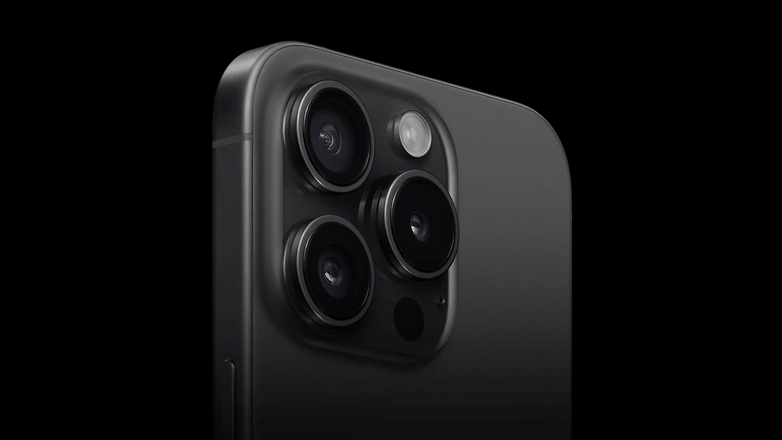
Under the hood is the new Apple A17 Pro, incidentally the first SoC in the 3 nm process. The chip from the N3 node should theoretically not only provide more performance with the same space requirement, but also improved efficiency and thus longer battery runtimes. The SoC also features hardware accelerators for ProRes encoding and an AV1 decoder.
Apple has also upgraded the GPU with 20% more performance, new shader architecture and hardware ray tracing. The Neural Engine is also said to be twice as fast as on the A16, allowing more tasks to be performed locally on the device, such as image editing. Matching game bangers are also coming to the iPhone 15 Pro, for example Resident Evil: Village.
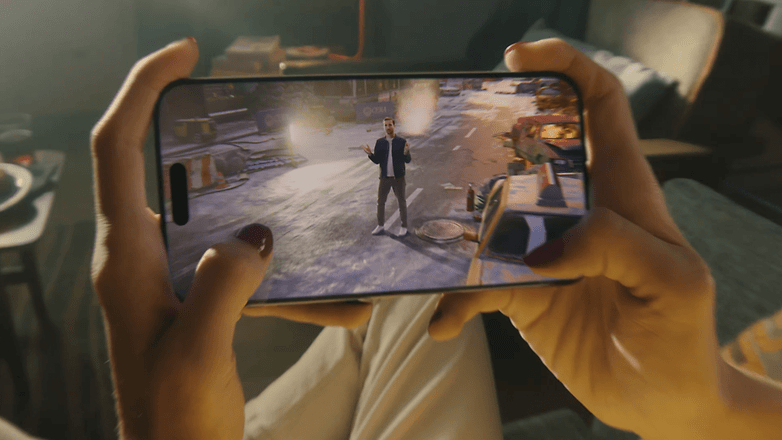
Of course, there's also an upgrade for the cameras this year. Apple has given the Pro models a larger 48 MP sensor, which is supposed to deliver even more quality, especially in difficult lighting conditions. The ultra-wide-angle camera again offers 12 megapixels, but Apple has only improved the coating and the macro capabilities—so the sensor is probably the same.
And then there is the telephoto camera, where the Pro and Pro Max differ again this year. The iPhone 15 Pro has a 12 MP telephoto camera with a focal length of 77 mm, just like the predecessor. The iPhone 15 Pro Max also has 12 MP, but a KB focal length of 120 mm. Thanks to a new sensor shift in all three axes and a focal ratio of F2.8, the telephoto camera is supposed to deliver good results even in low light.
The Pro series also gets more power in the USB-C port. Thanks to USB 3, data transfer rates of up to 10 GB/s are possible. You can even record directly to an external SSD via USB while filming. The Pro iPhones now also support ProRes with 4K60, LOG video and the ACES color system.
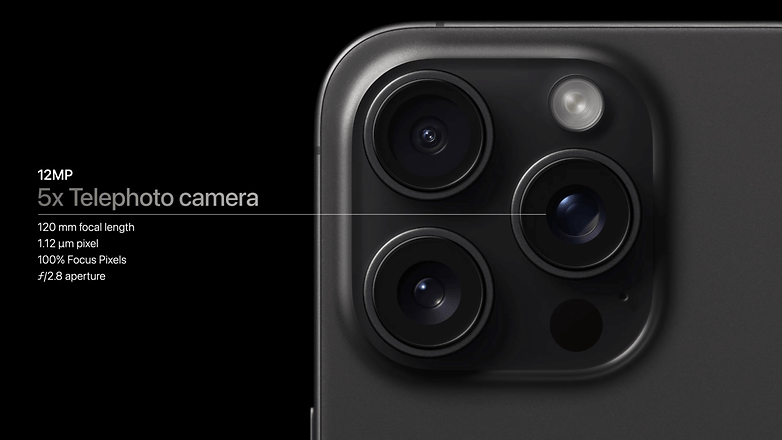
In addition, the iPhone 15 Pro and Pro Max can also record 3D videos using the ultra-wide-angle and main cameras, which you can then watch on the Apple Vision Pro. After all, you don't want to film your little kids' birthday with XR glasses on your nose—right?
The iPhone 15 Pro and Pro Max come in blue, black, silver and gray - in all colors, the titanium frames have a rugged industrial feel, which I personally like a lot. But who uses their sinfully expensive iPhone without a case?
You can pre-order the iPhone 15 Pro and iPhone 15 Pro Max here starting Sept. 15, 2023. The iPhone 15 Pro costs at least $999, the iPhone 15 Pro Max starts at $1,199.
iOS 17 becomes even more personal
Of course, not only the iPhone, but also iOS 17 was a big topic at the Apple keynote. Here, too, there were a few new features that we have not yet been able to admire in the iOS beta.
For example, there are a few new portrait features for pets. In addition, you will be able to change the focus of all portrait photos after taking them. Whether this works with all iPhones with iOS 17 or only with the new iPhone 15 series is still unclear.
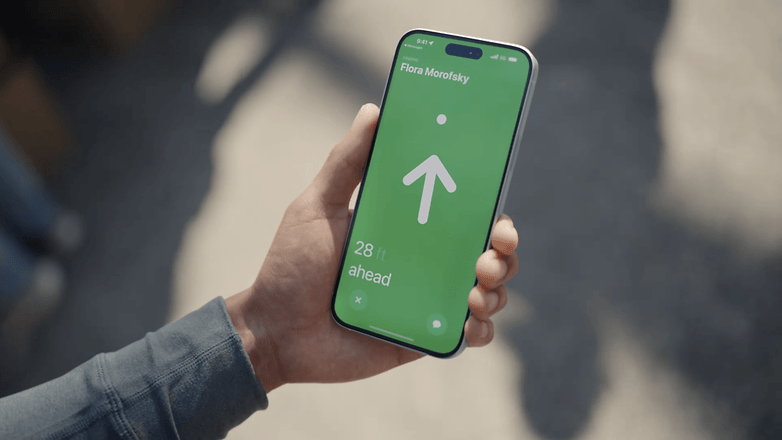
Another new feature is roadside assistance via satellite. In the U.S., Apple is partnering with AAA, the ADAC counterpart there. Buyers of the iPhone 15 can use the feature for free for two years.
You can find more information about the new Apple operating system and many how-tos on our large overview of iOS 17, for example, how the live tickers of iOS 17 work, how to use NameDrop correctly or how the new standby mode turns your iPhone into a smart display.
New cases with fabric instead of leather
Apple is banning leather from its cases portfolio and is instead relying on a material called FineWoven—a type of fine fabric. In addition, there will still be the classic transparent cases and silicone cases.
New Apple Watch models: Watch Ultra 2 and Watch 9
Sure, you can't have a September Apple event without new smartwatches. This year, we'll see two new models: the Apple Watch Ultra 2 and the Apple Watch Series 9, so fans of the SE series will probably have to wait until early 2024.
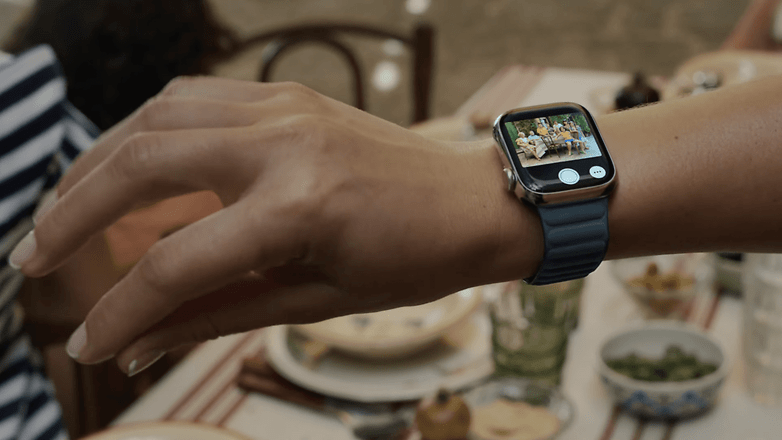
Both new Apple Watch models get the new Apple S9 SiP, which has learned a cool new trick. Using a gyroscope, accelerometer and heart rate sensor, the smartwatch detects what you're doing with your hand. When you tap your index finger and thumb together twice, you trigger an action. Apple calls this "Double Tap".
This is supposed to be especially great when you only have one hand free and want to trigger the primary button of the currently active app. For example, you can accept or end calls, press play and pause, or call up the smart stack on the watch face and scroll through it. Once my brain has subconsciously learned that you can also press the Snooze button via Double Tap, I will simply never wake up again.
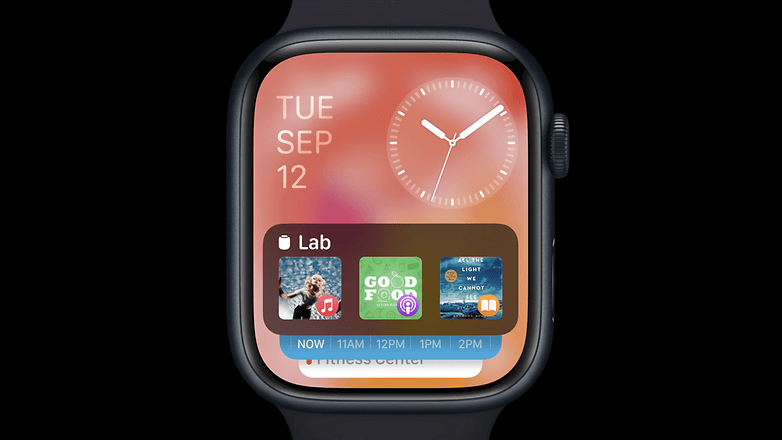
The Apple S9 SiP also includes a new Neural Engine, which is supposed to offer twice the performance for machine learning applications. As a result, Siri now runs locally on the Apple Watch models and is supposed to respond faster—and regardless of poor cellular or Wi-Fi connections.
In addition, both new models get the Apple U2 chip, which enables better UWB communication with compatible devices, for example with the correspondingly equipped iPhone 15 models or the Apple Vision Pro. You can then track your iPhone in direction and distance on the smartwatch—just like it currently works with AirTags.
Apple Watch Ultra 2
With the Apple Watch Ultra 2, Apple's flagship smartwatch enters its second round. Most of the changes take place under the hood here—purely visually, the two watches look completely identical according to the first impression.
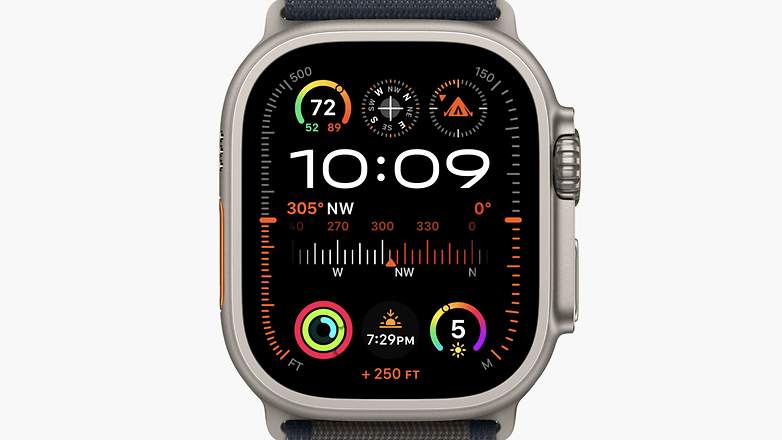
The display has the same dimensions as the predecessor, but offers an even higher brightness with a maximum of 3,000 nits. There is also a new watch face called "Modular Ultra" to match. As the name suggests, you can adjust the screen very flexibly to your needs with altimeter, dive depth, second display and more. Apple promises: "There has never been a watch face with a higher information density - and with automatic redshift night mode.
As for the rest of the technical data, not much has changed - apart from the previously mentioned S9 SiP. The battery life is still 36 hours in normal mode and 72 hours in energy-saving mode. Furthermore, dual-band GPS is once again on board.
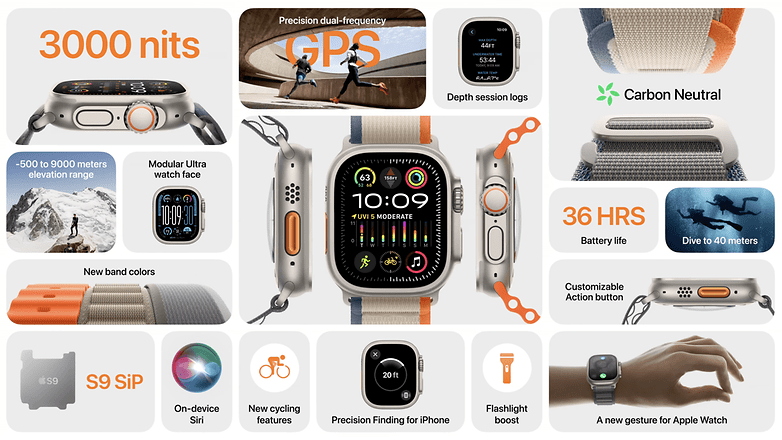
Apple Watch 9
Less surprising was the upgrade of the regular Watch series, which goes into the next round with the Watch Series 9. The innovations in the Watch are very reminiscent of the Apple Watch Ultra 2: Apple-S9-SiP and U2 chip, but otherwise rather innovations in the details.
The display has the same dimensions and features - except for the brightness. In direct sunlight, 2,000 nits are now possible (instead of 1,000 nits in the predecessor). And on the other hand, the Apple Watch 9 can now dim down to 1 nit, so you won't burn your retinas at night when you want to take a peek at the watch.
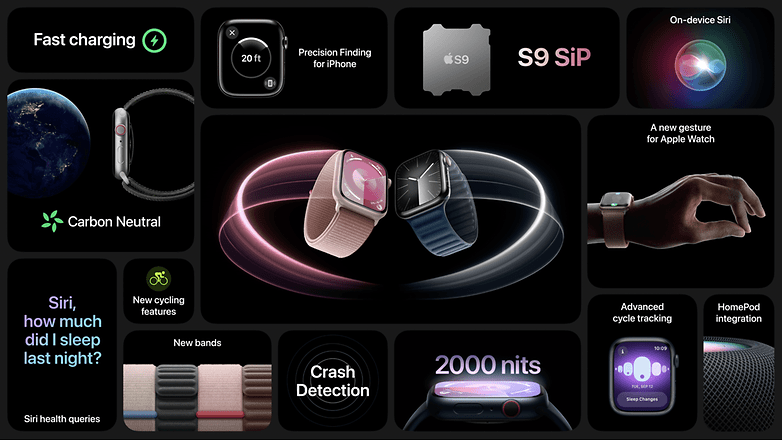
And then there was an interesting statement from Apple: the Watch 9 is supposed to be Apple's firstCO2-neutral product. According to Apple, this also applies to the Watch Ultra 2 in conjunction with the Alpine or Trail Loop.
watchOS 10
Sure, in addition to the hardware, the associated operating system also gets some screen time. In the process, Apple presents us with some new features that we didn't know from the previous beta versions of watchOS 10.
At the end of this year, Siri will learn a few exciting new functions in watchOS 10 (and presumably other Apple systems as well), especially when it comes to health features. For example, you'll be able to ask "How long did I sleep last night?" Or when you're on the scale, you can say, "My weight today is ...", and so on. The feature is expected to launch in English & Mandarin later this year, with other languages to follow soon.
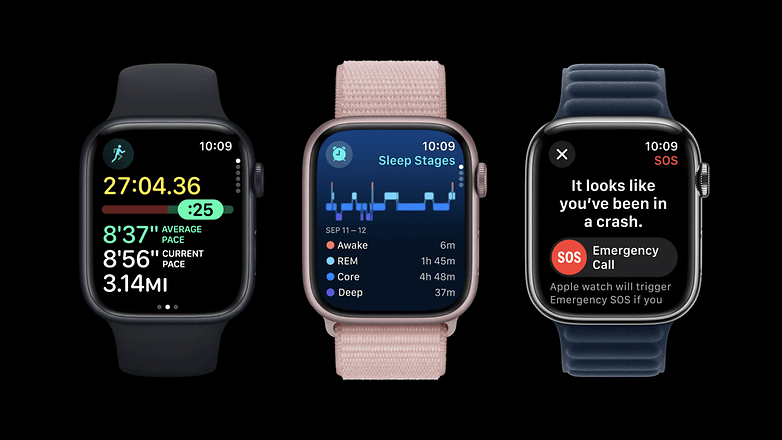
There's also a new feature with the HomePod. If your smartwatch gets close to a HomePod, then it automatically displays corresponding options, for example, to start media playback. Apple has not yet revealed exactly which models are compatible here.
It is also exciting that watchOS now supports new Bluetooth sensors for cyclists, namely cadence, speed and power sensors. Fittingly, there are also power zones for bike workouts and a corresponding live activity for the iPhone.
- Read more about the new operating system version and its features in our large overview of watchOS 10.
New wristbands for the Apple Watch
Like the iPhone 15, the Apple Watch 9 and Apple Watch Ultra 2 also get wristbands made of the new FineWoven material. Here, too, the manufacturer is removing leather completely from the portfolio. In addition, there are also collaborations with Hermès and Nike including, of course, corresponding wristbands and matching watchfaces.
Which innovations from the Apple event did you like best—and which disappointed you the most? I look forward to your opinion in the comments!










